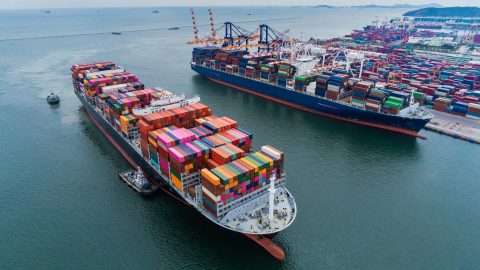
The Chinese economy has failed to live up to high expectations for several months now. The former growth engine among the emerging markets is struggling with challenges on several fronts at once – with the upcoming US presidency of Donald Trump, another one is likely to be added soon.
China’s government has recently promised further support measures for the country’s struggling economy. As reported by the state news agency Xinhua, the committee under the leadership of President Xi Jinping announced a “more proactive” fiscal policy for 2025. This indicates that the state plans to spend more money in a targeted move to boost the economy.
In addition, the Politburo spoke of a “moderate easing” of the monetary policy, which is also seen as a measure to strengthen the economy as well as a fortification against the tariffs threatened by US President-elect Donald Trump. In a recent interview with the television channel CCTV, China’s President Xi Jinping expressed optimism that the targeted five percent growth will be achieved in the current year.
Economy lags behind
Economically, China is currently going through a weak phase, marked by geopolitical tensions, the crisis in the domestic real estate sector and weak domestic consumption. Demand remains low, while the indebted construction industry is hindering growth. A comparison with the US reveals another problem for the Chinese economy: while the US economy continues to boom and is struggling with inflation rates that are still too high, China is worried about a deflationary trend, as the following chart shows:
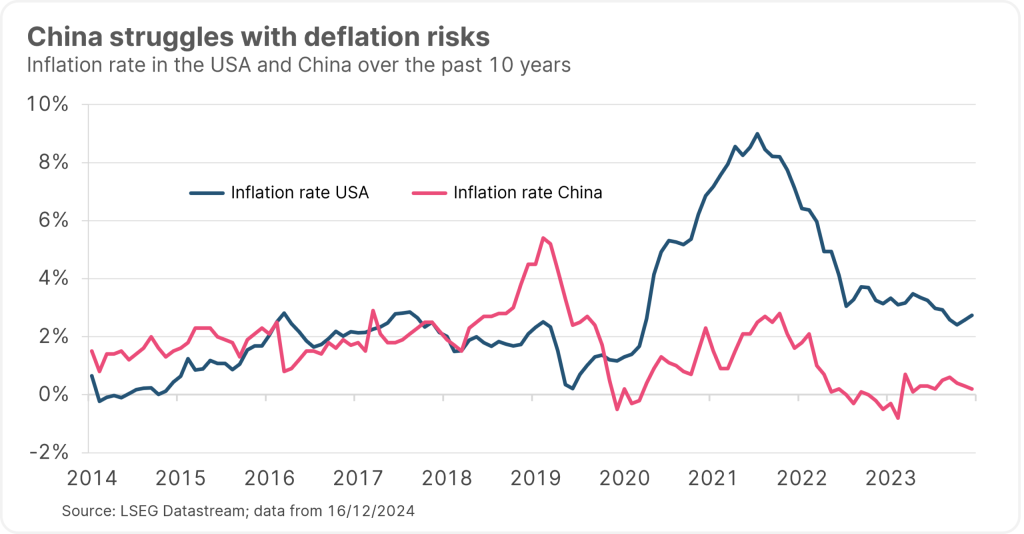
With this in mind, the government presented an economic stimulus package in September to stabilize the economy, which included measures such as lowering the minimum reserve rate for banks and mortgage rates, as well as aid for the real estate and financial markets.
Chinese industry recently surprised with decent gains
However, while Chinese domestic consumption and foreign trade developed poorly and the election of US President-elect Donald Trump threatens new trouble in the form of a trade war, the countrys’s economic data recently surprised with decent growth: industrial development in November was surprisingly positive, with China’s industrial production up 5.4 percent from the same month in the previous year.
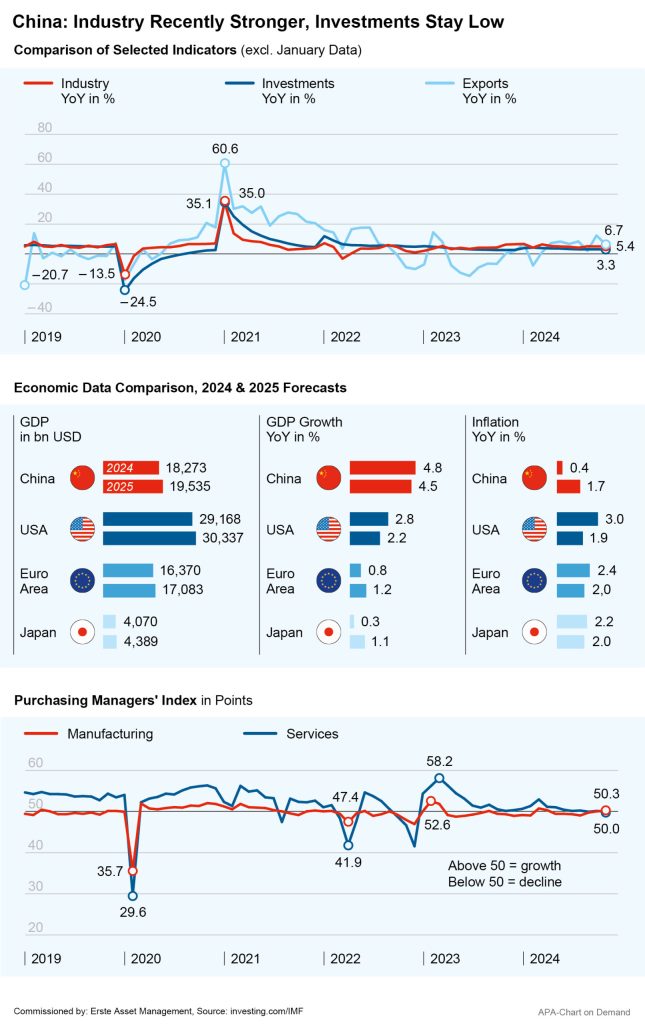
The purchasing managers’ indices for industry, which are determined by surveys, were also positive in November. The purchasing managers’ index for the manufacturing industry calculated by the business newspaper Caixin rose from 50.3 points in the previous month to 51.5 points. This exceeded analysts’ expectations and is the highest level since June. The official PMI also rose in November, from 50.1 to 50.3 points, and so remained above the 50-point mark, which signals growth.
According to Caixin, the increase is mainly due to new orders from home and abroad. While exports were surprisingly weak in November according to official data, export orders rose for the first time in four months and reached the highest level in seven months, going by Caixin data. However, experts attribute this to a potential one-time pull-forward effect, where many customers may have brought forward orders to pre-empt the higher tariffs announced by Trump.
China braces for looming trade war with the US
Trump has announced that as the next US president, he will increase tariffs on imports from major trading partners such as Canada and Mexico. Imports from China will be subject to an additional 10 per cent tariff; previously Trump promised tariffs of up to 60 per cent. Next year, these tariffs could pose major challenges for China’s economy.
Chinese President Xi Jinping recently warned of the consequences of a trade war with the US. “There will be no winners,” Xi said, according to the television station CCTV. In view of the increasing international tensions, China has already been trying to make itself less dependent on Western markets. The country is trying to diversify its trade relations and open up new markets, notably in Africa.
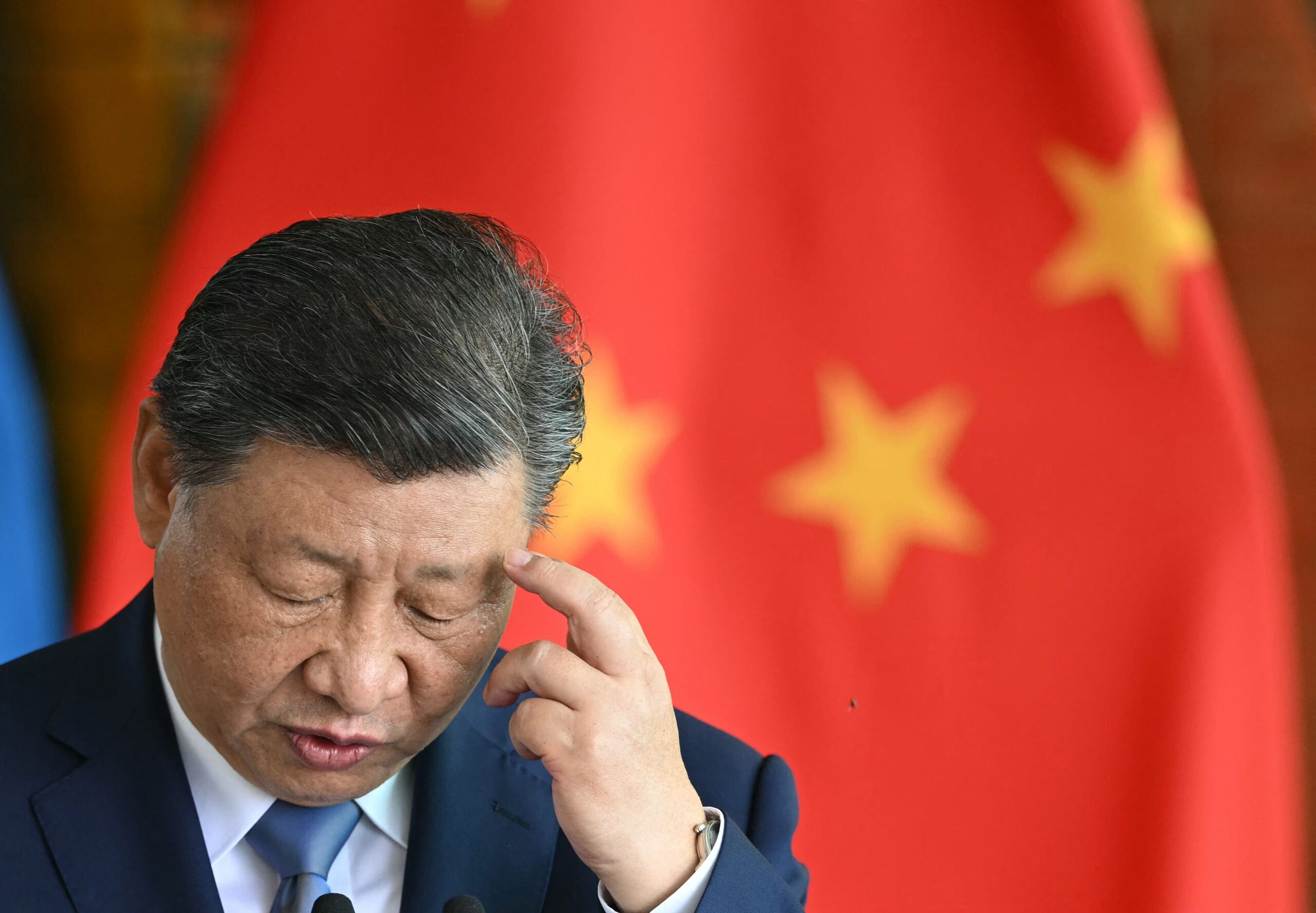
China’s President Xi Jinping wants to arm himself against the threat of US tariffs with targeted measures. © EVARISTO SA / AFP / picturedesk.com
In response to Trump’s tariff threats, China’s top politicians are also considering devaluing the yuan in 2025, the Reuters news agency reported, citing three insiders. A devaluation of the currency could make Chinese exports cheaper and thus mitigate the effects of higher US import tariffs.
Domestic consumption expected to play a more important role in the future
In view of the looming trade wars, domestic consumption is likely to play a more important role for China’s economy going forward. While the strong export economy has been able to compensate for weak domestic demand so far, economic growth is now more dependent on domestic demand.
However, consumption in the country has recently weakened, with retail sales, an important indicator of consumption, only growing by 3.0 per cent in November. This is a significant decline compared to the October figure of 4.8 per cent. Imports also fell significantly in November by 3.9 per cent compared to the same month last year, which also points to weak consumption and could indicate longer-term reluctance among consumers. The Chinese government wants to counteract this with more state funds to support companies and households.
Chinese shares recently lagged behind the global market
The difficult economic situation in China has also left its mark on the country’s stock market, as a comparison of the MSCI China share index with the MSCI World shows. While the former tracks the performance of the largest 581 listed companies in China, the MSCI World represents the performance of almost 1,400 listed companies from developed markets around the globe.
Note: Past performance is not a reliable indicator of future performance.
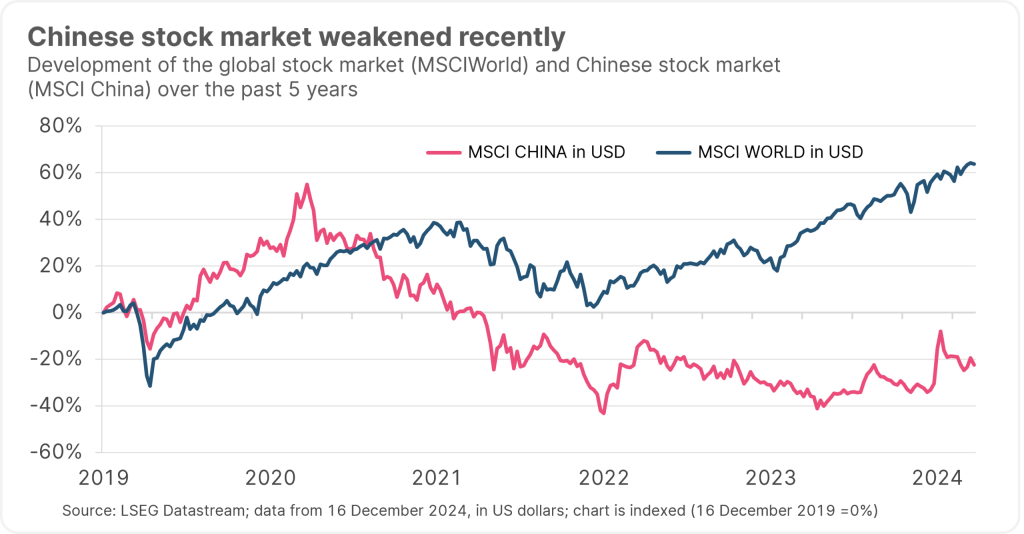
The MSCI China recovered faster than the MSCI World from the Covid-related slump at the beginning of 2020, but subsequently fell behind the performance of the global market due to the economic difficulties and the smouldering property crisis.
Investors’ hopes for the coming year therefore lie in Beijing’s planned support measures. Gerold Permoser, CIO of Erste Asset Management, also sees this as a key point in his outlook for the stock market year 2025: ‘The Chinese government’s economic stimulus measures could hold a positive surprise if they have an impact beyond China.
How investors can bet on the upswing
The ERSTE STOCK EM GLOBAL equity fund could be worth a look for investors who want to bet on an upturn on the Chinese stock market. The fund invests in companies based or operating in the global emerging markets, with the Chinese market currently accounting for around 30% of the portfolio. The top 10 positions include globally active Chinese companies such as the e-commerce giant Alibaba and the internet group Tencent. Note: The companies listed here have been selected as examples and do not constitute an investment recommendation. The above portfolio positions may change at any time as part of active management.
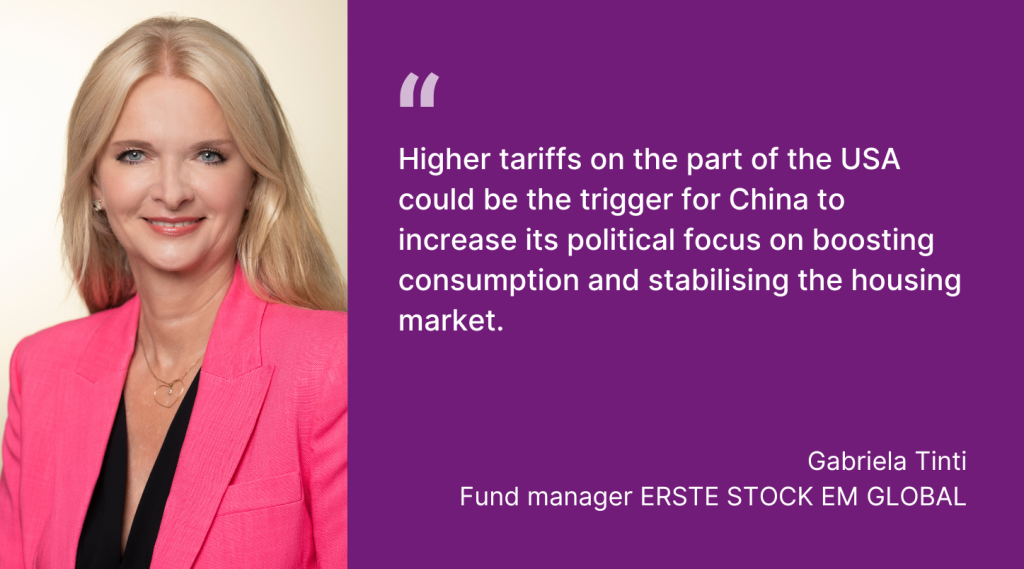
Fund manager Gabriela Tinti certainly sees potential for the Chinese market: ‘Higher tariffs from the US could be the trigger for China to increase its political focus on boosting consumption and stabilising the housing market.’ The weighting in China and Taiwan was increased in 2024 due to the medium-term growth prospects and attractive valuations. ‘The companies invested in there are benefiting from the megatrends of AI, 5G data/cloud, electric cars and computer games,’ summarises Tinti. However, it should be noted that an investment in emerging markets harbours a higher risk potential than in developed markets.
Further information on the fund and its investment strategy can be found on our website.
Risk information ERSTE STOCK EM GLOBAL
Please note that investing in securities harbours risks in addition to the opportunities described above.
The fund pursues an active investment policy. The assets are selected on a discretionary basis. The fund is based on a benchmark index (for licensing reasons, the specific index used is stated in the prospectus, point 12 or the ‘Objectives’ key information document). The composition and performance of the fund may deviate significantly or completely, positively or negatively, in the short and long term, from that of the benchmark index. The Management Company’s discretionary powers are not restricted.
Legal disclaimer
This document is an advertisement. Unless indicated otherwise, source: Erste Asset Management GmbH. The language of communication of the sales offices is German and the languages of communication of the Management Company also include English.
The prospectus for UCITS funds (including any amendments) is prepared and published in accordance with the provisions of the InvFG 2011 as amended. Information for Investors pursuant to § 21 AIFMG is prepared for the alternative investment funds (AIF) administered by Erste Asset Management GmbH pursuant to the provisions of the AIFMG in conjunction with the InvFG 2011.
The currently valid versions of the prospectus, the Information for Investors pursuant to § 21 AIFMG, and the key information document can be found on the website www.erste-am.com under “Mandatory publications” and can be obtained free of charge by interested investors at the offices of the Management Company and at the offices of the depositary bank. The exact date of the most recent publication of the prospectus, the languages in which the fund prospectus or the Information for Investors pursuant to Art 21 AIFMG and the key information document are available, and any other locations where the documents can be obtained are indicated on the website www.erste-am.com. A summary of the investor rights is available in German and English on the website www.erste-am.com/investor-rights and can also be obtained from the Management Company.
The Management Company can decide to suspend the provisions it has taken for the sale of unit certificates in other countries in accordance with the regulatory requirements.
Note: You are about to purchase a product that may be difficult to understand. We recommend that you read the indicated fund documents before making an investment decision. In addition to the locations listed above, you can obtain these documents free of charge at the offices of the referring Sparkassen bank and the offices of Erste Bank der oesterreichischen Sparkassen AG. You can also access these documents electronically at www.erste-am.com.
Our analyses and conclusions are general in nature and do not take into account the individual characteristics of our investors in terms of earnings, taxation, experience and knowledge, investment objective, financial position, capacity for loss, and risk tolerance. Past performance is not a reliable indicator of the future performance of a fund.
Please note: Investments in securities entail risks in addition to the opportunities presented here. The value of units and their earnings can rise and fall. Changes in exchange rates can also have a positive or negative effect on the value of an investment. For this reason, you may receive less than your originally invested amount when you redeem your units. Persons who are interested in purchasing units in investment funds are advised to read the current fund prospectus(es) and the Information for Investors pursuant to § 21 AIFMG, especially the risk notices they contain, before making an investment decision. If the fund currency is different than the investor’s home currency, changes in the relevant exchange rate can positively or negatively influence the value of the investment and the amount of the costs associated with the fund in the home currency.
We are not permitted to directly or indirectly offer, sell, transfer, or deliver this financial product to natural or legal persons whose place of residence or domicile is located in a country where this is legally prohibited. In this case, we may not provide any product information, either.
Please consult the corresponding information in the fund prospectus and the Information for Investors pursuant to § 21 AIFMG for restrictions on the sale of the fund to American or Russian citizens.
It is expressly noted that this communication does not provide any investment recommendations, but only expresses our current market assessment. Thus, this communication is not a substitute for investment advice.
This document does not represent a sales activity of the Management Company and therefore may not be construed as an offer for the purchase or sale of financial or investment instruments.
Erste Asset Management GmbH is affiliated with the Erste Bank and austrian Sparkassen banks.
Please also read the “Information about us and our securities services” published by your bank.

